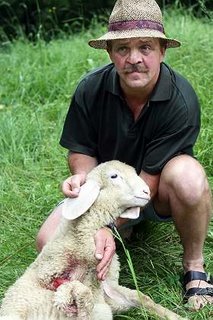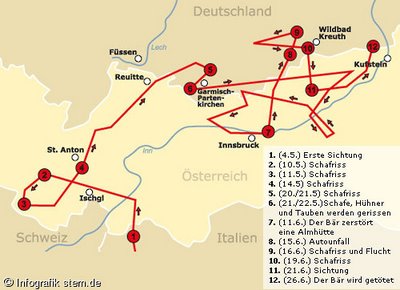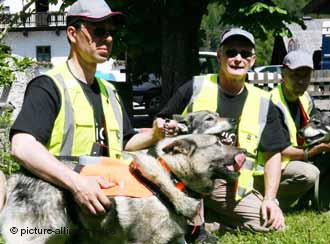Cheap, Bloodthirsty Bavarians Mercilessly Gun Down First Brown Bear to Visit das Vaterland in One-Hundred-Seventy-One Years

"Im Fussball sind wir auf dem Weg, Weltmeister zu werden, im Naturschutz aber nur Kreisklasse."
-- Olaf Tschimpke of NABU
The extermination of its wild animals is one of the sorriest episodes in the Germans' long and illustrious history. For instance, they killed their last brown bear way back in 1835.
In recent years, the EU-supported Projekt Life Ursus has successfully relocated dozens of bears from Slovenia, where an estimated four-hundred-fifty of them remain, to Italy, Austria, and Switzerland. On May 20th, one of these bears, Bruno (See photo above), wandered into Bavaria from his birthplace in Trentino, Italy and thus thereby provided the Germans with a golden opportunity to make amends for their ancestors' mistakes.
At first, the Germans were ecstatic. "Der Bar ist in Bayern willkommen," Bavarian Umweltminister Werner Schnappauf declared. In the weeks that followed the two-year-old, two-hundred-pound bear competed with the German football team's quest for the World Cup for space on page one of the dailies and airtime on radio and television.
Not about to miss out on such a fortuitous development, manufacturers quickly moved to cash in on Bruno's notoriety by marketing a special edition Bruno teddy bears that sold for one-hundred-twenty euros. A "Hunt Bruno" game and a song in his honor appeared on the Internet.
German hospitality is as fickle as a woman's heart, however, and it did not take long for Bruno to wear out his welcome. All it took was for him to slaughter a few dozen sheep (See photo below), some chickens and rabbits, and to raid a commercial beehive or two before the Bavarian authorities promptly rolled up the welcome mat and called in the exterminators.
Public outcry initially stilled the murderers' guns and forced the authorities to at least mount a halfhearted attempt to capture the bruin alive. (See Cat Defender post of June 19, 2006 entitled "Irresponsible Cat Owner Allows Declawed Tomcat Named Jack to Tangle with Black Bear in Northern New Jersey.") By the time the clock struck 4:50 a.m. on June 26th the Bavarians' patience had worn out and Bruno's short tragic life came to a violent end when he was cornered by three sharpshooters near Schliersee (fifty kilometers south of Munich) and mercilessly pumped full of lead.
As the blood drained out of his veins and his stout heart ceased beating, a part of the German Seele also vanished into the pre-dawn Bavarian mist. Gone too was the Germans' chance to do right by their brown bear neighbors.

Bruno's senseless and savage killing sparked immediate condemnation from animal rights organizations, lawsuits by private individuals, and deaths threats against the murderers and even the blowhard Schnappauf himself. Hubert Weinzierl, president of Deutschen Naturschutzring, called the shooting "die dummste aller Losungen." (See Stern, June 26, 2006, "Blamage fur Bayern.")
Olaf Tschimpke, president of the environmental group NABU, used a football analogy in order to point out the inherent hypocrisy of Germans who work to save tigers, elephants, and rhinoceroses in Africa and Asia all the while they exterminate bears at home. "Im Fussball sind wir auf dem Weg, Weltmeister zu werden, im Naturschutz aber nur Kreisklasse," he told Stern.
Neither was the significance of Bruno's killing lost on the German youth. BundJugend, for instance, called the bear's murder a "tragedy for Bavarian nature protection." (See Der Spiegel, June 26, 2006, "Brown Bear Meets a Tragic End.") Meanwhile, the mass circulation das Bild termed Bruno's death "a shot into our hearts. It hurts." The tabloid went on to add, "Bruno has symbolized a feeling: the forest is alive! Bruno was the living teddy bear in a world of mobile phones, flat screen TVs, and frustration with politics."
Deutschland's neighbors were even harsher in their criticism. For instance, the Austrian animal rights group Four Paws immediately called for a police investigation into Bruno's murder. "We are extremely dismayed that Bruno had to die," the group said in a statement released to the media. (See Deutsche Welle, June 26, 2006, "Germany's 'Problem Bear,' Bruno, is Dead.")
In Italy, Environment Minister Alfonso Pecoraro Scanio called the bear's shooting unacceptable. "A European Union which appeals to the whole world to save protected species and then shoots dead a bear with rifles simply isn't credible." (See Der Spiegel, June 29, 2006, "Everyone Wants Stuffed Bruno.") Fulco Pratesi, head of the Italian chapter of the World Wildlife Fund (WWF) said it best when he called the killing an "Akt der Barbarei." (See Stern article cited supra.)
The reintroduction of brown bears into Deutschland was a tragedy waiting to happen from the outset and both animal rights activists and politicians have Bruno's blood -- as well as that of the farm animals that he killed -- all over their hands. Roland Melisch of the WWF's German branch told Deutsche Welle in the article cited supra that signs warning people about the bear should have been posted in the Bavarian Alps. He also pointed out that dogs could have been employed to frighten him away from farm animals and that electric fences could have been installed around beehives. He also suggested that livestock should have been kept inside at night. He did not, however, explain why none of these precautions were undertaken beforehand.
Once Bruno had become a problem, the Bavarian authorities imported Karelian Bear Dogs and experienced trackers (See photos below) from Finland and hired a German sharpshooter to tranquilize him with a dart. Bear traps (See photo immediately below) were also imported from Montana. The stated goal was to sedate Bruno and then remove him to Wildpark Poing near Munchen to live out the remainder of his life.
However well intended, this plan quickly degenerated into a comedy of errors. The Finnish trackers complained that they could not take the heat and that the hills were too steep for them to get up and down. On several occasions when their GPS-equipped dogs were able to locate Bruno they were unable to catch up with either them or the bear.

Although the thermometer has been in the 80s (Fahrenheit) recently in Bavaria, this is not any excuse for the trackers' ineptitude. The authorities should have hired trackers who could have dealt with the heat and the hills. Secondly, it is difficult to see the value in equipping dogs with GPS. A good hunter should never allow his dogs out of either hearing range or sight.
Bears and other wild animals can rip a dog to shreds in a minute; consequently, hunters need to be able to keep up with their canines not only in order to get their quarry, but also to protect their dogs. It is difficult to imagine how the trackers ever expected to dart Bruno if they could not even keep up with their dogs.
Therein lies the rub as Shakespeare would say. Thirty-eight-year-old backpacker Christian Gareis, who unexpectedly ran across Bruno last Saturday, followed him on foot for several hours during which time he telephoned the police every ten minutes for an hour and a half but was repeatedly told that they were not interested in taking any action. (See Der Spiegel, June 27, 2006, "Hiker Says Bruno Could Have Been Saved.")
The petit fait that several days earlier Bruno had sauntered down the streets of Kochel and rested undisturbed for a while on the steps of the police station lends credence to the view that the authorities were never serious about taking him alive. In this instance, the worthless, good-for-nothing cops were no doubt either sleeping or cowering in fear underneath their desks. Cops never do anything worthwhile; they are all bums, crooks, and brutes.
It is also suspicious just how quickly and easily the Bavarians killed Bruno once the shoot and kill order was issued last Sunday. The murderers were able to accomplish in less than twenty-four hours what the trackers and dogs were unable to do in a fortnight! Even Germany's Environment Minister Sigmar Gabriel admitted, "It's not clear to me why he couldn't be tranquilized." (See Der Spiegel's June 27th article cited supra.)

During his five-week sojourn along the Austrian and Bavarian border (See map above), it is estimated that Bruno traveled at least three-hundred kilometers and crisscrossed an area equal to six-thousand kilometers. Throughout all of his rambles he never once attacked a human although he had numerous opportunities to have done so had he been so inclined.
By the end of last week the effort to capture him had cost the Bavarian authorities one-hundred-twenty-five-thousand euros ($157,000) and that is most likely the real reason, not human safety, that they initialed his death warrant. Unwilling to invest any more money in the pursuit of a humane solution, they opted instead for an easy, cheap, and violent resolution to the problem. Moreover, by exterminating Bruno they saved the money that they would have been forced to spend sheltering and feeding him for the remainder of his life.
By playing upon the fears of a gullible public and pandering to livestock owners, the politicians milked this tragedy for all that it was worth. Farm animals must certainly be protected from predators and what Bruno did to the ones that he attacked was horrible. It is nonetheless important to remember that livestock owners are not animal lovers; they genetically modify their animals, abuse them, and in the end ship them off to the slaughterhouses. All of this is undertaken in the pursuit of the almighty euro and without an ounce of either compassion or remorse.
Despite how murderously Bavarian officials have treated Bruno, Klaus Hening Groth of the WWF's Berlin office had the audacity to tell the CBC's As It Happens on June 26th that he still believes that brown bears have a future in Germany. Weinzierl was a good deal more forthcoming when he told Stern: "Baren der Welt, meidet Bayern."

Based upon opinion polls, the large number of letters written to public officials, and the numerous memorial websites established in Bruno's honor, the German people appear to be generally in favor of having bears in Deutschland and that is a positive development. It would, however, be senseless to bring in more bruins until the ruling elite are forced to treat them humanely.
Instead of giving poor Bruno the decent and respectful burial that he so richly deserves, the vultures are already picking over his bones. Former skiing champion Markus Wasmeier wants to stuff Bruno and display him at his agriculture and winter sports museum in Schliersee while the neighboring village of Bayrischzell insists that it has a legitimate right to his carcass because he was killed within its jurisdiction. Controversial huckster Gunther von Hagens wants to cut up Bruno and display him in pieces as part of his infamous "Body Worlds" exhibition. All of these unscrupulous opportunists are out of luck, however, because the Bavarian authorities have already decided to give Bruno' hide to the Munich Museum's Mensch und Nature exhibit.
Before the taxidermists get him, scientists will take DNA samples from him and cut out his bones and organs for future study and instruction. Not only is the upkeep of a dead bear considerably cheaper than that of a live one, but there is also considerably more money to made from Bruno's remains than from him alive.
As this life and death drama unfolded over the past few weeks it was often pointed out that Bruno's problems stemmed from his lack of fear of humans. Whether this proclivity was due to prior positive interactions with humans or the lack thereof it is not known. There can be no doubt, however, that humans are lethal to all animals.
Photos: Der Spiegel (Bruno, Sheep, and bear trap), Deutsche Welle (Karelian dogs), and Stern (map).

<< Home